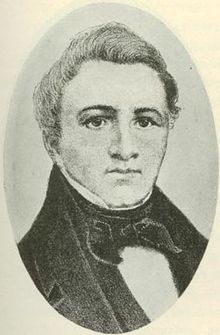Joseph Duncan
Joseph Duncan (born February 22, 1794 in Paris , Bourbon County , Kentucky , † January 15, 1844 in Jacksonville , Illinois ) was an American politician and from 1834 to 1838 the sixth governor of Illinois. He also represented this state between 1827 and 1834 as a member of the US House of Representatives .
Early years and political advancement
Joseph Duncan served as an officer in the British-American War of 1812 and received an award from Congress for his valiant demeanor in the defense of Fort Stephenson , Ohio . Since 1823 he was a general in the National Guard . In the early 1830s he also took part in the Black Hawk War . In 1821 he had settled in Kaskaskia , Illinois. Until 1823 he was Justice of the Peace in Jackson County . Duncan served in the Illinois Senate between 1824 and 1826 . He then represented his state in the US House of Representatives in Washington, DC There he stayed between 1827 and 1834.
Illinois Governor
In 1834, Duncan was run by the Democratic Party as a candidate for gubernatorial elections and was subsequently elected to that office by Illinois voters. He began his four-year term on December 3, 1834 and initially campaigned for the Internal Improvement Act , a large-scale program to improve infrastructure. Accordingly, streets and canals should be expanded on a large scale. When the governor realized the cost of the program, he abandoned it. The state parliament, however, had already put the law into force and was determined to enforce it. The work began and resulted in the expected high costs. In 1841 the program was stopped because it was unaffordable. The resulting debts burdened the state budget until 1882. Independent of this program, which was passed in 1837, construction work on the Illinois-Michigan Canal began in 1836.
During Duncan's tenure, the capital of Illinois was moved from Vandalia to Springfield (1839). Established in 1833, Chicago was officially recognized as a city. Duncan also worked to improve the school system. It was also during his tenure that John Deere invented his steel plow. In later years his company would become one of the largest companies in Illinois.
Further career
Due to a constitutional clause, Duncan could not run again immediately after his term in office. So he had to leave office on December 7, 1837. He initially retired to his home in Jacksonville. In 1842 he applied, meanwhile changed to the Whigs , to return to the office of governor, but was defeated by the Democrat Thomas Ford with 45:54 percent of the vote. He died in January 1845. Joseph Duncan was married to Elizabeth Caldwell Smith, with whom he had ten children.
Web links
- Joseph Duncan in the National Governors Association (English)
- Joseph Duncan in the Biographical Directory of the United States Congress (English)
- Illinois Blue Book History and Election Results, p. 363
- Biography (English)
- Joseph Duncan in the database of Find a Grave (English)
| personal data | |
|---|---|
| SURNAME | Duncan, Joseph |
| BRIEF DESCRIPTION | American politician |
| DATE OF BIRTH | February 22, 1794 |
| PLACE OF BIRTH | Paris , Bourbon County , Kentucky |
| DATE OF DEATH | January 15, 1844 |
| Place of death | Jacksonville , Illinois |


